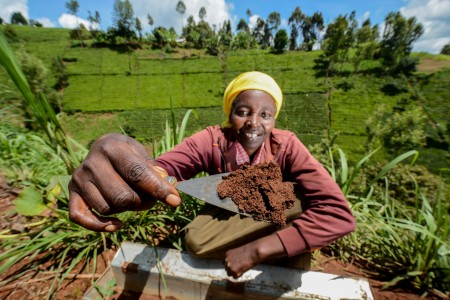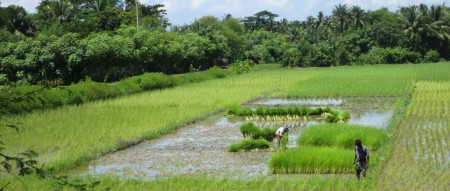The WLE 2016 Annual Report > Facilitating community-led science

Community-led science and participatory videos for ecosystem service sustainability
Engaging rural communities in the research process is a common element in research for development. Taking this participation a step further can lead to important insights and interactions among all involved parties. WLE has been testing new approaches to community-led – or citizen – science and participatory video, challenging research teams and communities to explore new and effective ways of sharing knowledge and experience.
Participation brings behavior change in the Mekong Delta
In Vietnam, WLE has brought together citizen science and field observation in an innovative combination to monitor ecosystem services, co-design research questions and collect data. Partnering with local communities as well as NGOs, national research institutes, universities and government departments, the WLE team helped build awareness of effective land and water resource management. Residents from three villages affected by saltwater intrusion, periodic flooding, pollution of waterways, and lack of electricity have helped identify and guide the development of a range of future, local level, socio-economic development scenarios. These scenarios help the communities to understand the impacts of individual and community activities and their own role in sustainably managing water resources.
Led by Vietnamese NGO, WARECOD, community members and WLE researchers selected what all felt was a practical, feasible development path to improve flood protection and increase water and electricity supply. The path they identified combines local knowledge and experience with international research expertise and is tailored to ensure the sustainability of ecosystem services, even when faced with climate variability.
WARECOD and the WLE team involved communities directly in the research and strategy development process using Thaibaan research, a participatory farmer-led (as opposed to scientist-led) research method, while taking particular care to ensure inclusivity through active participation of women and ethnic minorities. The Thaibaan approach, which was developed in Thailand, aims to enable local people to design and carry out natural resource research projects on issues important to their daily lives. The use of photovoice was encouraged by the WLE team to foster capacity building and learning exchange without the need for high levels of literacy.
Early results indicate that those involved in the community-led science activities now have a better understanding of, for example, how rubbish disposal and pesticide use today is likely to affect their future livelihoods. The farmers have also begun to adapt their livelihoods strategies in ways that improve their incomes while minimizing the impact of their activities on the environment.
Video production as a pathway to communication and capacity building
In Kenya and Ghana, WLE initiatives led by the International Center for Tropical Agriculture (CIAT) have used participatory video production as an approach to engage local communities, give diverse community members a voice, and to foster capacity building and knowledge exchange.
The WLE research team was keen to learn why the farmers make certain resource management choices, what their needs and challenges are, and what other factors impact their decision making.
Through the participatory video process, 19 farmers in North Alego, Kenya, produced a video that details their hopes and aspirations, as well as the challenges they face. The farmers also explain how important training and information exchange is for addressing these challenges and achieving their goals.
In the Upper East Region of Ghana, 11 members of farming communities from the villages of Damolgo and Sekoti expressed their views on local land management issues and recorded themselves on camera. Five women and six men learned how to shoot video footage, conduct on-camera interviews and edit the footage with guidance from the WLE research team, which included CIAT, the International Union for Conservation of Nature (IUCN), University for Development Studies (UDS) and the Association of Church-based Development NGOs. The result is a film the group called Ti Na Nyang - We Can in which members describe key aspects of farming important to them and their communities, including managing on and off-farm tree mulching, using manure and crop waste as fertilizer, the downsides of bush burning, and how and why they use stone bunds and contour planting. Through district level platforms and screenings, a total of five participatory videos presented the trade-offs involved in different sustainable land management options with a focus on ecosystem-based management.
These innovative participatory processes create opportunities for researchers to learn more about rural communities and the social, economic and environmental challenges they face. By engaging communities directly in the research process, WLE works to ensure that the research and its outputs are relevant to those communities, addressing their needs and concerns and helping to foster sustainable agricultural intensification within specific ecosystems.
Towards sustainable intensification:
stories of real-world sciencewater, land and ecosystems research highlights
Phase 1
Since its inception in 2012, the CGIAR Research Program on Water, Land and Ecosystem (WLE) has developed scientific evidence and solutions for sustainably intensifying agriculture.
For WLE, sustainable intensification means more than minimizing agriculture’s environmental footprint; it means making sure that agriculture benefits both the planet and its people, providing global populations with food and nutritional security, resilience and livelihoods.
WLE researchers and their partners work across scales, disciplines and sectors to find sustainable, viable ways to transform agriculture, locally and at scale. Discover how the resulting solutions can lead to real-world change by exploring the briefs and stories below to.
New briefs on sustainable intensification
Achieving resilient food systems requires identifying incentives for sustainable farming, developing new policies and institutions, as well as working with diverse stakeholders to test and scale integrated solutions.
The program’s findings so far are summarized in a new series of briefs, Towards sustainable intensification: Insights and solutions.
The series aims to guide and support decision and policy makers, investors and others working to achieve sustainable intensification of agriculture. Each brief is focused on a topic of strategic relevance and provides analysis of and recommendations on how to place sustainability at the heart of agri-food systems.
in 2015 wle: field tested 62 technologies and natural resource management practices, helped 125,000 farmers to apply new technologies or management practices, supported improved technologies or management practices on 2.5 million hectares
Influencing policy and decision making
In 2015 WLE: established 41 multi-stakeholder platforms and influenced 200 policy processes
Promoting innovative business models and institutions
Facilitating community-led science
WLE in 2015 had 110,000 website visits and 43,000 views on CG-space and published 141 ISI publications and 94 open access publications














